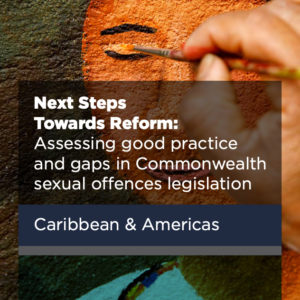Guyana undertook major reforms of its sexual assault laws in 2010 when it enacted the Sexual Offences Act 2010 (SOA) and again in 2013 under the Sexual Offences Amendment Act 2013.
Guyana’s High Court has established a specialist Sexual Offences Court to hear all first instance charges of rape and sexual assault, as well as offences of domestic violence. The Court in the capital, Georgetown, is equipped with a special room for hearings and a panel of support staff. There is a plan to roll out at least one other specialist court room for the Sexual Offences Court in other parts of the country.
In many aspects, Guyana’s reformed sexual assault laws meet good practice standards, including for example providing for gender-neutral offences, not criminalising sexual activity with a person with a disability and legislating to ensure that marital rape is a crime. The reforms also introduced a definition of ‘consent’ to mean freely given agreement to have sexual intercourse or other sexual contact. The law criminalises a range of child sexual assaults, including grooming and excludes the defences of consent for these offences. The age of consent in Guyana is 16 for heterosexual sexual activity. There are close-in-age defences to child sexual assaults to avoid criminalising young people and children who engage in consensual heterosexual sexual activity with their peers, provided that the accused person is not in a ‘position of trust’ in relation to the child. A case study on Guyana’s rape and sexual assault laws is included as an example of good practice in the Trust’s Good Practice Sexual Offences Report.
However, Guyana continues to criminalise consensual same-sex sexual activity, and uses derogatory and stigmatising language to do so, under the Criminal Law (Offences) Act (CLOA), violating its international legal obligations and the fundamental rights of every person to equality, equal protection of the law, privacy and non-discrimination. Laws that criminalise consensual same-sex sexual activity, such as ‘buggery’ and ‘sodomy’, should be repealed and all non-consensual sexual acts, including anal ‘rape’, should be included in the standard sexual assaults provisions, such as ‘rape’ and ‘sexual assault’, as well as in child sexual offences. All of these crimes should be gender-neutral.
Guyana is a state party to relevant international and regional human rights treaties, including the Inter-American Convention on the Prevention, Punishment, and Eradication of Violence against Women (Convention of Belém do Pará), UN Convention on the Elimination of All Forms of Discrimination against Women, Convention on the Rights of the Child, Convention on the Rights of Persons with Disabilities, Convention against Torture and Other Cruel, Inhuman or Degrading Treatment or Punishment and International Covenant on Civil and Political Rights.
Read more about the criminalisation of LGBT people in Guyana.
The full assessment of Guyana is available here.



